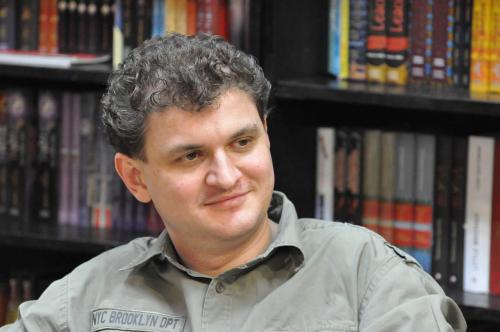Literatura de Azi (Today’s Literature): Perpetuating culture in the Internet age
by Claudia Moscovici
The notable Romanian literary critic Daniel Cristea-Enache recently launched Literatura de Azi, a literary and culture blog that features essays by Romanian critics, fiction writers and artists. The blog includes sections on literary criticism by Daniel Cristea-Enache himself, Alex Stefanescu, Dan-Liviu Boeriu, Ovidiu Nimigean, Lia Faur and Anca Goja; poetry by Emil Brumaru and Radu Vancu; creative writing by Selian Turlea; artwork selected by the painter Laurentiu Midvichi, music selected by Gabriela Pop, and my own section of book reviews on the Holocaust. The list of contributors will continue to grow as the blog expands. Literatura de Azi also benefits from an excellent and energetic team of editors: Odilia Rosianu (Editor-in-Chief), Anca Goja and Romina Hamzeu (Managing Editors), Irina Ionita (Editor), Nona Carmen Rapotan (Junior Editor) and Adrian Pop (Web Master). Promoting culture via the Internet is no easy task: first of all because many consider “culture” and “the Internet” to be a contradiction in terms; secondly because it’s easy for whatever is considered “culture” to get lost in the deluge of all kinds of information. In fact, this is a problem the world of publishing faces in general.
Both publishers and authors are becoming increasingly concerned with the question of how to promote books effectively, capture the interest of readers and generate sales. Given the number of books out there, without an outstanding publicity campaign, each given book risks passing unnoticed. The competition for readers is tremendous given that an astronomical number of books are published each year. The United Nations Educational, Scientific and Cultural Organization (UNESCO) cites that roughly 2,200,000 books are published annually. Out of curiosity, I looked up the two countries I write about most which, not coincidentally, are also those where I’ve lived: the U.S. and Romania. In 2010, 328,259 were published in the U.S. and in 2008 14,984 books were published in Romania. Given this large number of books published in the U.S. alone, it’s difficult to believe how difficult and competitive the process of publishing can be (as I explain in an earlier article on the subject):
in English:
And yet publishing your manuscript is only the beginning of the gargantuan task of rising to the surface in an ocean of information. On the one hand, the mass media and the Internet in particular makes sharing our cultural products easier in some ways, by facilitating access to an audience. For instance, anyone can self-publish and promote a novel nowadays, through blogs, twitter, youtube and other popular venues on the internet. But this apparent democratization of culture also makes it a lot tougher to stand out from the crowd. Each cultural product–be it a novel, a collection of poems, a song, a film or a painting–competes with tens of millions of others. It’s hard to find or discern anymore what we value and what we don’t in this tidal wave of information that assails us from all directions on a daily basis. So how do quality books, and culture in general, rise to the surface?
To draw another analogy, it’s as if we heard talented classical musicians playing their instruments at the same time as others howl, scream, talk and yell in various languages. Or, if you prefer to avoid making any value judgments, as if we heard them playing at the same time as other talented musicians practice other songs. Either way you look at it, what reaches our ears will sound like a maddening cacophony, to the point that we can no longer discern the music we prefer from the surrounding noise we’d like to ignore.
In a world of information (and publication) overload, publicizing culture becomes both a necessity and a challenge. This is precisely what Daniel Cristea-Enache explains in an editorial called “Romania of the Year 2014” (Romania Anului 2014) on Literatura de Azi (Literature of Today):
in English translation:
“Today, almost a quarter of a century after the anti-communist revolution, it’s clear that the Romanian people and their social sphere have changed. The internet first registered this transformation, then it accelerated it. Readers–especially the younger generations–don’t obtain their information from traditional channels (it’s noteworthy that newspapers have declined even more dramatically than cultural journals) but from the Internet. We can protest this reality; we can be nostalgic; we can pull our hair out; we can laugh with a sense of superiority; we can sigh with regret: but this is the reality we face and it won’t change just because we want it to. It’s not reality that will adapt to us, in an open and pluralist society. We have to adapt to the increasing predominance of the Internet. The immediate question that arises is: if we notice this predominance, do we oppose it or do we make use of it?” (Daniel Cristea-Enache)
in Romanian:
“Astăzi, la aproape un sfert de secol de la Revoluție, e limpede că lumea românească și spațiul ei social s-au schimbat. Internetul întîi a constatat schimbarea, apoi a accelerat-o. Cititorii – mai ales cei tineri – nu își mai iau informația de pe canalele tradiționale (e semnificativ că ziarele au căzut încă mai dramatic decît revistele culturale), ci de pe net. Putem să protestăm împotriva acestei realități, putem să fim nostalgici, putem să ne smulgem părul din cap, putem să rîdem cu superioritate, putem să suspinăm cu jale: aceasta este realitatea și ea nu se schimbă după cum vrem noi. Nu realitatea are a se adapta la noi, într-o societate deschisă și pluralistă. Noi avem a ne adapta la realitatea dominației, tot mai accentuate, a internetului. Întrebarea care se pune imediat este dacă, o dată ce constatăm această dominație, ne împotrivim ei sau o folosim.” (Daniel Cristea-Enache)
Daniel Cristea-Enache goes on to argue that the first strategy is utopic. Literary production can’t avoid the Internet. Nor can it combat singlehandedly its vast and growing influence. He states that perhaps with great effort a single writer can impose upon himself isolation from the contemporary world of mass media; a kind of Rip VanWinkle hibernation. But the whole field of cultural production–literature in itself–certainly can’t follow this strategy. What Daniel Cristea-Enache proposes, and what the entire project of Literatura de Azi epitomizes, is the adaptation of “high culture” to the age of the Internet. This goal abandons the binary opposition between Culture (with all the implicit hierarchies of judgment and value that Pierre Bourdieu and others analyzed) and the Internet (mass media, without standards of value). Cristea-Enache adopts a pragmatic and modern approach to cultural value: namely, that of “transforming the Internet not in the goal of literature but in its cultural instrument, through which literature can reach as many readers as possible.” (“Chestiunea, după mine, este să transformăm internetul nu în scopul literaturii, în ținta ei – ci în instrumentul cultural prin care literatura poate ajunge la cît mai mulți cititori.”)
Being a practical person, Daniel Cristea-Enache practices what he preaches. Literatura de Azi, a blog that has already become in a matter of months a very prominent conduit of literature and culture in Romania (and that has the potential of growth internationally through syndicated columns in several languages) shows that literature, art, film and poetry can, indeed, survive the age of mass media information. But they won’t reach readers and viewers on their own. Holding on to the past or hoping for the best in the present aren’t workable strategies for promoting culture in our times. Promoting culture takes a lot of organization, energy and team work by editors, critics, authors, publishers and readers who still believe in the value of good books and do their best to help them rise to the surface in the sea of information. For more information, see Literatura de Azi‘s website, http://www.literaturadeazi.ro/
Claudia Moscovici
Literature Salon




